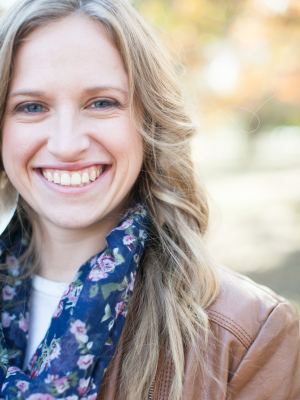In spring 2011, I lost myself.
Maybe more accurately, I realized I had no idea who I was in the first place.
I had lived in Puerto Rico for six months. I felt isolated – far from my family and friends who knew me best. I was trying to fit in with a different culture, but didn’t feel at home anywhere. My job at a new nonprofit had little work/life boundaries. There was always more to do, so I kept pushing my limits. I didn’t dare slow down for fear of what people would think of me.
The truth was, I couldn’t keep up. I was exhausted. I daily fell short of how I thought I should perform. I made mistakes, and the guilt completely crippled me. I was angry at myself. This is the job I dreamed of, I thought, why can’t I get it together? Am I not good enough? Slowly, the questions racing through my brain turned into an endless cycle of criticism. By the time I moved back to Austin nine months later, I no longer wondered if I was good enough – it was clear to me I wasn’t. I didn’t ask if I was a failure – I honestly believed I was one.
Looking back on that season, it’s clear I was not in a healthy place. What’s also clear is I didn’t know myself well enough to recognize how harmful I was toward my own heart, soul and mind. It never occurred to me that maybe there was a different way of thinking toward myself, that maybe I could offer myself grace and love in the same way I tried to offer it to others.
As women, we’re bombarded daily with the unreasonable expectation that we should be able to do it all, perfectly. Needless to say, it’s easy to become overly critical of ourselves. If we’re not mindful of our thoughts, those criticisms set up camp in our minds. We start to believe the critic inside of us is truthful, and in response we treat ourselves harshly – angry that we can’t seem to measure up.
As I’ve walked through the healing process from that 2011 season, I’ve asked myself three questions over and over. These questions help me get to know myself, and develop an appreciation for how I operate best as a person. They uncover my tendencies in stressful circumstances so I can take steps to care for myself as I would a friend, instead of harshly criticizing how I was created. I hope they do the same for you.
1. Are you paying attention?
We are constantly thinking and feeling. How often do we stop and listen to what’s going on inside our minds, hearts and souls? In the past, I tried to talk myself out of thinking or feeling negatively. I would say things like, “Don’t think (or feel) like that. You’re fine.” Now, I try to listen first, to understand where it’s coming from. Before I can truly care for myself, I have to determine what I’m actually thinking or feeling, not what I should be thinking or feeling.
One way I practice paying attention is by keeping a journal. When I start writing, the truth of what’s in my head and heart comes out on paper. It’s my way of getting it all out on the table. For you, paying attention could be going on a walk, or talking with a close friend. Whatever it looks like, I encourage you to practice listening to yourself.
2. Who says?
 There are two conflicting voices in my head – the critic and the caretaker. The critic typically pushes me to do more, to strive for better no matter the cost. The caretaker pushes me to love, simplicity, and grace. The critic can sound like the most logical, responsible voice. The caretaker invites me into freedom from my own, and others’ expectations. I’m trying to listen to the caretaker more so these days. “Who says?” is how I filter my thoughts to determine which voice is speaking.
There are two conflicting voices in my head – the critic and the caretaker. The critic typically pushes me to do more, to strive for better no matter the cost. The caretaker pushes me to love, simplicity, and grace. The critic can sound like the most logical, responsible voice. The caretaker invites me into freedom from my own, and others’ expectations. I’m trying to listen to the caretaker more so these days. “Who says?” is how I filter my thoughts to determine which voice is speaking.
For example, if I hear a thought like, “You should be doing something productive instead of spending time with your husband,” I ask “Who says the healthiest thing for me is to cross items off a to-do list instead of nurture an important relationship in my life?” That sounds a lot like the critic.
Once I figure out who’s talking, I look to my emotions to figure out who I’m actually listening to. I’m a feeler first, so my emotions typically give me a strong indication of which voice is getting priority in my mind. If I feel anxiety, paral
yzing fear, or discouragement, I’m listening to the critic and need to change direction. If I feel peace, fullness, or freedom? I believe the caretaker.

Download this cheat sheet to optimize underperforming posts on your website.
3. How can I best care for myself?
This last question may be the most important. How we choose to treat ourselves directly impacts how we treat others. If we want to love others well, let’s love ourselves well. This is our chance to turn listening into love.
Last Friday night, my brain was exhausted, and I knew deep down I was spent from the work week. But, my mind wouldn’t stop racing with to-dos for the weekend. The critic said, “You should keep working a little longer.” The caretaker said, “Yes, you have things to do this weekend, but it’s ok to take tonight to rest and recover.” What did I need most? I needed to sip red wine and watch the sunset. I needed to cook dinner and enjoy homemade vanilla ice cream. I needed to do simple things that keep me grounded and restore my soul. So I did them. And my mind, body and soul thanked me for it.
The answer to this last question can be anything. Listen for it, and then follow through. You’ll thank yourself too.
When was the last time you truly cared for yourself? I’d love to hear!
 Lindsay lives in Austin with her husband, Taylor, where they spend their days enjoying the outdoors and searching for the best pizza in town. She loves Jesus, and writes stories of life and faith at lindsaybixby.com. Follow along with her on twitter and instagram at @lindsaybixby!
Lindsay lives in Austin with her husband, Taylor, where they spend their days enjoying the outdoors and searching for the best pizza in town. She loves Jesus, and writes stories of life and faith at lindsaybixby.com. Follow along with her on twitter and instagram at @lindsaybixby!
